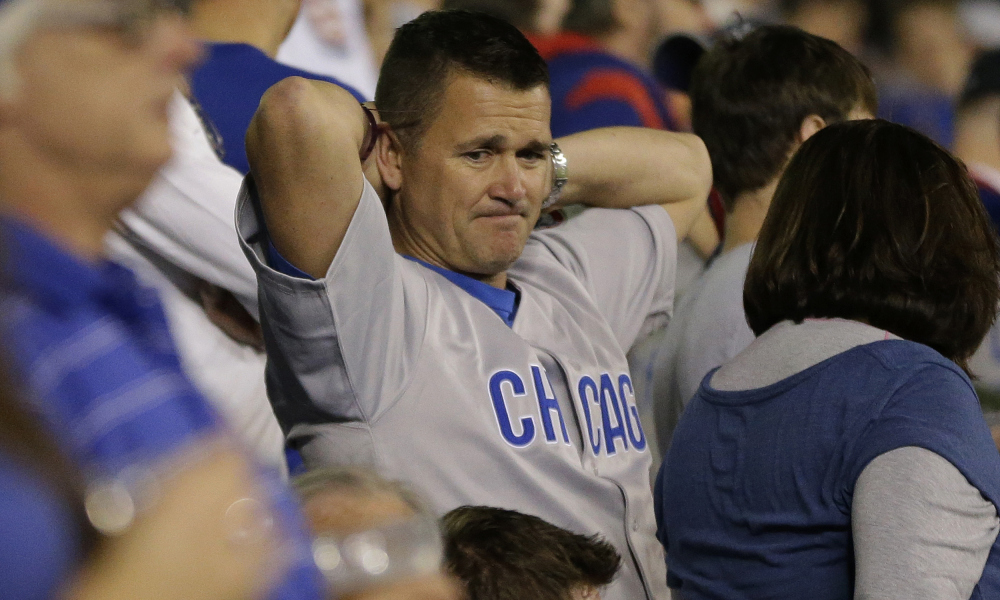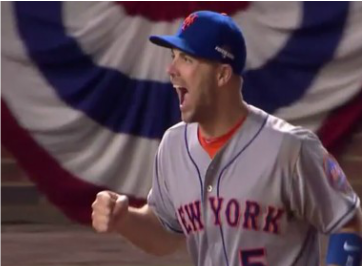|
The saddest sight I have seen in a ball park in a long time was the Cub fans in Wrigley Wednesday night.
They know the team lore; their hopes were raised a year ahead of schedule; and the Mets just crushed the home team. They took it with civility and grief, not with anger. The Cubs had run into a team from nowhere, with all the changes in late July and early August. Now Cubs’ fans, all National League fans, better face the reality that the four starting pitchers are just coming into their own, barring more injuries, with Zach Wheeler due back next year. For the present, there was a constant in the Mets’ coup de grace in Wrigley – David Wright, the captain. Mendel, the thoughtful writer who regularly graces these Comments, watched Wright conducting interviews on the field, eloquent and positive, and asked me if team captains were always that verbal. My answer is, Wright, the son of a police officer,is an unusual blend of positive attitude and belief in process. He has remained youthful in his way. He is a leader. It was a thrill to see Wright come back from injury and the diagnosis of spinal stenosis to make plays like the one Wednesday when he swooped in, picked up a roller and beat the batter by half a step – the split-second play that helps win games, and pennants. Afterward, Wright spoke of teamwork, and fulfilling nearly a decade of hopes of fans and players. He has been special since he arrived in 2006. I remember Cliff Floyd, just passing through the Mets, raving about Wright as the future of the franchise, making it easy for the kid to fit in. We've had some great captains in New York. I still call Willis Reed "Cap'n" when I see him; he was the heart of the Knicks. (The Yankees had a triumvirate of Jeter and Rivera and Posada – the unsung sergeant at arms, the dean of discipline.) They didn’t talk as much about the dynamics. Wright is his own blend of verbal attention to teamwork and activist monitoring of the clubhouse. The night Wilmer Flores cried, Wright and Michael Cuddyer followed Flores into the clubhouse to sort out the rumors. Leadership. When I was a kid in the late 40's and 50's, ball players were not nearly as media savvy. Also, they were not pressed for interviews long before the current era of twitters and sound bites. Two great captains in baseball were Terry Moore of the Cardinals and Pee Wee Reese of the Dodgers -- teams that hated each other in ways we cannot imagine today. On a train ride in the last hectic week of 1941, Moore sidled up to a kid just up from the minors who was winning games as the Cardinals tried (in vain) to catch the Dodgers. Who are you? Moore asked in a parlor car. (Nobody in the St. Louis press bothered to write about the kid.) The kid said he was the bad-arm lefty who had given up a homer to Moore in a spring workout that March. Moore learned his name: Stan Musial. They became fast friends. The Dodgers of the same era had Harold (Pee Wee) Reese from Louisville, Ky. He (and a few others) set the right tone for Jackie Robinson's debut and Reese had a light but serious presence in the clubhouse. In the mid-1950's, The Cap’n spotted young Gino Cimoli dressed and heading for the door shortly after a game. "Gino, if you're in a rush to get out of the clubhouse, you're in a rush to get out of baseball,” Reese said. Cimoli sat down, and talked baseball. Wright is in that mold. Remember last March when he saw young Noah Syndegaard chowing down lunch in the clubhouse during an exhibition. Wright told him to get out there on the bench. To make the point, Bobby Parnell picked up Syndegaard’s lunch and deposited it in the trash barrel. That would be the same Syndegaard leading the league in 98-mph pitches as the Mets rush into the Series. Here’s Tim Rohan’s article from last March: : http://www.nytimes.com/2015/03/05/sports/baseball/noah-syndergaard-and-david-wright-clear-the-air-about-mets-lunch-incident.html?_r=0 Terry Moore and Pee Wee Reese would appreciate this modern verbal captain at work.
Mendel
10/23/2015 05:22:24 am
Thanks for this, George.
Chris Vecsey
10/23/2015 06:10:57 pm
In one of those post-Cub interviews on the radio David Wright kept saying, "We're going to the World Series! The World Series!" What a pleasure to hear his excitement.
Altenir Silva
10/24/2015 12:03:49 pm
Dear George,
Michael Green
10/24/2015 01:00:00 pm
Great piece. I'm reminded of the story in The Boys of Summer of Billy Cox between games of a doubleheader saying he couldn't play any more, that he had to "save something." The clubhouse was silent and Reese said, "For what, Billy, an exhibition game in Altoona?" Cox played the second game.
George Vecsey
10/25/2015 10:20:19 am
Beautiful. Pee Wee got Cox's home state right. Thanks. GV Comments are closed.
|
Categories
All
|











